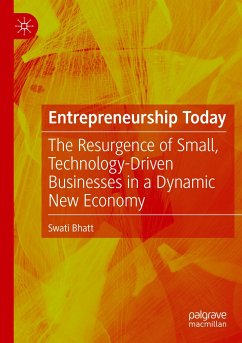This book explores how the U.S. has been in the throes of a startup revolution, fueled by a risk-taking culture. There has been a growth of young startup from 1994, accelerating after 2010 through the present day. Most entrepreneurial activity is in the professional and business services sector, which comprises technical services as well as research and development.
However, new establishments face a low survival rate, suggesting that starting businesses is not the problem, sustaining their development and growth is the principal challenge. A paradox is presented by the simultaneous presence of declining labor force participation rate among prime working age adults, a decrease in productivity growth rates in the past decade and a startup revolution.
There are five native skills that are acquired by experience rather than formal education: resourcefulness, practical intelligence, over-optimism and personal initiative. These are built on a foundation of attributes that form the culture of risk-taking and decision-making. Underlying values and beliefs include collaboration, openness to new ideas, an awareness of the environment and the needs of people in your radius of interaction. A strongly embedded community forms the essence of entrepreneurial culture, and its values cannot be taught, they must be learned through experience.
However, new establishments face a low survival rate, suggesting that starting businesses is not the problem, sustaining their development and growth is the principal challenge. A paradox is presented by the simultaneous presence of declining labor force participation rate among prime working age adults, a decrease in productivity growth rates in the past decade and a startup revolution.
There are five native skills that are acquired by experience rather than formal education: resourcefulness, practical intelligence, over-optimism and personal initiative. These are built on a foundation of attributes that form the culture of risk-taking and decision-making. Underlying values and beliefs include collaboration, openness to new ideas, an awareness of the environment and the needs of people in your radius of interaction. A strongly embedded community forms the essence of entrepreneurial culture, and its values cannot be taught, they must be learned through experience.








